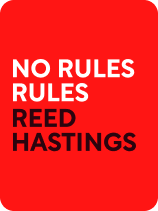

This article is an excerpt from the Shortform book guide to "No Rules Rules" by Reed Hastings. Shortform has the world's best summaries and analyses of books you should be reading.
Like this article? Sign up for a free trial here .
What is the organizational culture at Netflix? How has the Netflix Freedom and Responsibility culture been developed and maintained?
The Netflix Freedom and Responsibility culture focuses on having a high-performing staff and empowers them to act autonomously. Freedom is counterbalanced with responsibility at Netflix.
Read on for more about the Netflix Freedom and Responsibility culture.
Netflix: Freedom and Responsibility Are Essential
With a highly motivated staff and a culture of candor and accountability, Hastings was able to give his staff more freedom by removing controls.
Although giving employees so much freedom is unorthodox and can be risky, Hastings was confident that empowering his staff was in the company’s best interest:
- He had cultivated a talented workforce and culture of candor that kept employees and managers accountable to each other.
- He discovered that when companies have policies and processes to control employees’ behavior, it makes people feel that their judgment is being undermined, which kills the creative atmosphere.
In order to safeguard against abuse, remove controls strategically to ensure that employees understand the weight of responsibility and the context to make good decisions. If done well, this creates a culture in which freedom and responsibility spiral up: As employees enjoy more freedom, they act more responsibly, and as they act more responsibly, management can feel confident offering more freedom. That’s the core of the Netflix Freedom and Responsibility culture.
Empower Employees to Make Decisions
In most companies, all big decisions must pass through the higher-ups. However, managers and executives are not necessarily the most qualified to make decisions on everything from marketing strategies to financial structuring—that’s why they have competent staff to lead those efforts. When one or a handful of company leaders has the final say-so on everything, their lack of vision or fixed perspective can severely limit innovation. Additionally, running every decision up the chain of command slows progress and growth, and if the boss shoots down an idea, employees have to spend even more time developing a new proposal.
By contrast, Netflix follows a model of dispersed decision-making, which empowers lower-level employees to make decisions and own the consequences, rather than seeking approval from managers. People want the power to make their own decisions, and they perform best under these conditions: When employees have control over their projects, they feel ownership and are motivated to make sure the projects are successful. In fact, employees are encouraged to move forward on projects that they believe in, even if their bosses disagree. In the spirit of Netflix Freedom and Responsibility, the company urges its employees not to make decisions that will please their boss, but ones that will benefit the company.
When Going Global, Accommodate Cultural Differences
By 2011, Netflix had cultivated a “Freedom and Responsibility” culture that was enabling the company to produce great results in the U.S. The company began expanding globally and, by 2016, Netflix was in more than 130 countries worldwide. Hastings considered whether the corporate culture he’d worked so hard to develop would work outside the U.S. He made a plan to make the international expansion as smooth as possible:
- He would hire foreign employees who could adapt to the culture he’d cultivated.
- The company would train new hires on the ins and outs of working in the Netflix Freedom and Responsibility culture.
- Hastings would be willing to adapt to and learn from the cultures of his new employees.
Hastings found that his employees from other cultures often struggled most with Netflix’s culture of candor. This was one of the cornerstones of Netflix’s culture, but each country’s attitude toward candor and providing feedback—especially to superiors—differed greatly. Through their experiences, Netflix’s leaders learned important lessons for creating a middle ground in which employees from indirect cultures can still adhere to the company’s culture of candor:
- Create more opportunities for formal feedback, which is less daunting than delivering impromptu feedback. Make feedback an agenda item for meetings, provide instructions and a clear structure for the feedback, and invest time and effort in relationship building to soften the sting of negative feedback.
Learn about other cultures and adapt your feedback style accordingly. Keep in mind that colleagues from other cultures may have different attitudes toward frankness. Discuss and explore cultural differences. Adapt to giving and receiving feedback that is more (or less) candid than you’re typically comfortable with. Consider softening your negative feedback by refraining from placing blame and by framing the critique as a suggestion.

———End of Preview———
Like what you just read? Read the rest of the world's best book summary and analysis of Reed Hastings's "No Rules Rules" at Shortform .
Here's what you'll find in our full No Rules Rules summary :
- How Netflix achieved massive success in a short period of time
- The unusual business practices that have helped Netflix sustain its success
- Why Netflix fires adequate employees






